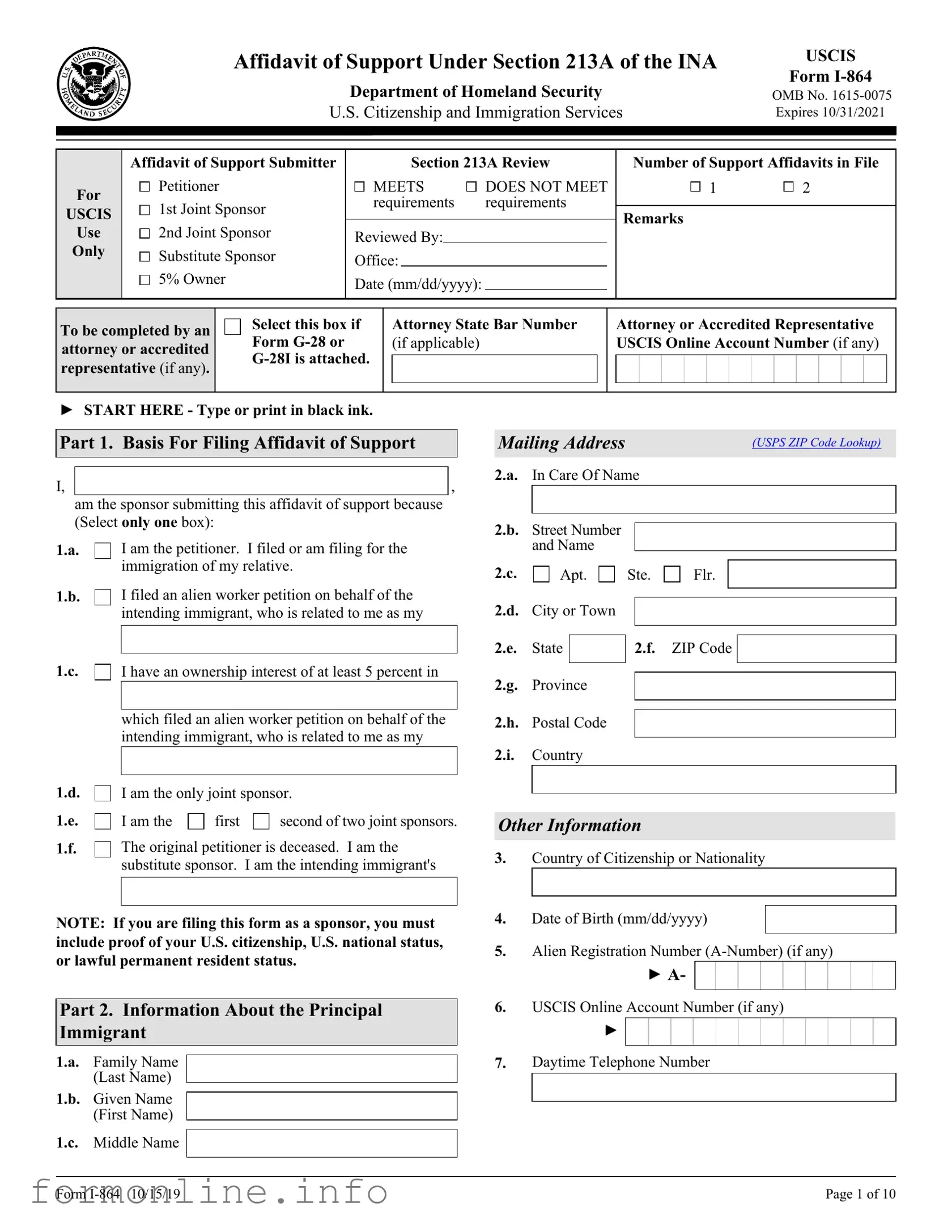Fill Out a Valid USCIS I-864 Form
The USCIS I-864 form, also known as the Affidavit of Support, plays a crucial role in the immigration process for many individuals seeking to become permanent residents in the United States. This form is a binding contract between a sponsor, typically a U.S. citizen or lawful permanent resident, and the U.S. government. By signing the I-864, the sponsor agrees to provide financial support to the immigrant, ensuring that they will not become a public charge. The form requires detailed information about the sponsor's income, assets, and household size, which helps determine whether the sponsor meets the necessary income requirements. Additionally, the I-864 must be submitted alongside other immigration forms during the application process, highlighting its importance in establishing the immigrant’s financial stability. Understanding the responsibilities and implications of the I-864 is essential for both sponsors and applicants, as it significantly impacts the immigrant's ability to secure a green card and their overall integration into American society.
Common mistakes
-
Incomplete Information: One of the most common mistakes is not filling out all required fields. Each section of the form must be completed accurately. Leaving any part blank can delay the processing of your application.
-
Incorrect Income Calculation: Applicants often miscalculate their income. It's crucial to include all sources of income and ensure that the figures are accurate. This includes wages, bonuses, and any additional earnings.
-
Failure to Provide Supporting Documents: Many people forget to attach necessary documentation, such as tax returns or pay stubs. These documents are essential to verify the information provided on the form.
-
Not Meeting the Income Requirement: Some applicants may not realize that they need to meet a specific income threshold. It's vital to check the current guidelines to ensure that you qualify as a sponsor.
-
Ignoring the Signature Requirement: Submitting the form without a signature is a frequent oversight. Remember, the form must be signed by the sponsor, and in some cases, by the co-sponsor as well.
-
Using Outdated Forms: Applicants sometimes use old versions of the I-864 form. Always ensure that you are using the most current version available on the USCIS website to avoid unnecessary delays.
Preview - USCIS I-864 Form

Affidavit of Support Under Section 213A of the INA |
USCIS |
|
Form |
||
Department of Homeland Security |
||
OMB No. |
||
U.S. Citizenship and Immigration Services |
Expires 10/31/2021 |
For
USCIS
Use
Only
Affidavit of Support Submitter

 Petitioner
Petitioner

 1st Joint Sponsor
1st Joint Sponsor

 2nd Joint Sponsor
2nd Joint Sponsor

 Substitute Sponsor
Substitute Sponsor

 5% Owner
5% Owner
Section 213A Review
MEETS |
DOES NOT MEET |
|||
requirements |
requirements |
|||
|
|
|
|
|
Reviewed By: |
|
|
|
|
Office: |
|
|
|
|
Date (mm/dd/yyyy):
Number of Support Affidavits in File
1 |
2 |
Remarks
To be completed by an |
Select this box if |
|
Attorney State Bar Number |
|
|
Attorney or Accredited Representative |
|
|||||||||||
Form |
|
(if applicable) |
|
|
USCIS Online Account Number (if any) |
|
||||||||||||
attorney or accredited |
|
|
|
|
||||||||||||||
|
|
|
|
|
|
|
|
|
|
|
|
|
|
|
|
|
||
representative (if any). |
|
|
|
|
|
|
|
|
|
|
|
|
|
|
|
|
|
|
|
|
|
|
|
|
|
|
|
|
|
|
|
|
|
|
|
|
|
|
|
|
|
|
|
|
|
|
|
|
|
|
|
|
|
|
|
|
|
|
|
|
|
|
|
|
|
|
|
|
|
|
|
|
|
|
|
►START HERE - Type or print in black ink.
Part 1. Basis For Filing Affidavit of Support
I, |
|
, |
am the sponsor submitting this affidavit of support because (Select only one box):
1.a. |
I am the petitioner. I filed or am filing for the |
|
immigration of my relative. |
1.b. |
I filed an alien worker petition on behalf of the |
|
intending immigrant, who is related to me as my |
Mailing Address |
(USPS ZIP Code Lookup) |
|
|
2.a. In Care Of Name
2.b. Street Number
and Name
2.c. 
 Apt.
Apt. 
 Ste.
Ste. 
 Flr.
Flr.
2.d. City or Town
1.c. |
I have an ownership interest of at least 5 percent in |
|
|
|
which filed an alien worker petition on behalf of the |
|
intending immigrant, who is related to me as my |
1.d. |
|
I am the only joint sponsor. |
2.e. State
2.g. Province
2.h. Postal Code 2.i. Country
2.f. ZIP Code
1.e. |
I am the |
first |
second of two joint sponsors. |
1.f. |
The original petitioner is deceased. I am the |
||
|
substitute sponsor. I am the intending immigrant's |
||
|
|
|
|
|
|
|
|
NOTE: If you are filing this form as a sponsor, you must include proof of your U.S. citizenship, U.S. national status, or lawful permanent resident status.
Other Information
3.Country of Citizenship or Nationality
4.Date of Birth (mm/dd/yyyy)
5.Alien Registration Number
►A- 






Part 2. Information About the Principal Immigrant
1.a. Family Name
(Last Name)
1.b. Given Name
(First Name)
1.c. Middle Name
6.USCIS Online Account Number (if any)
►







7.Daytime Telephone Number
Form |
Page 1 of 10 |
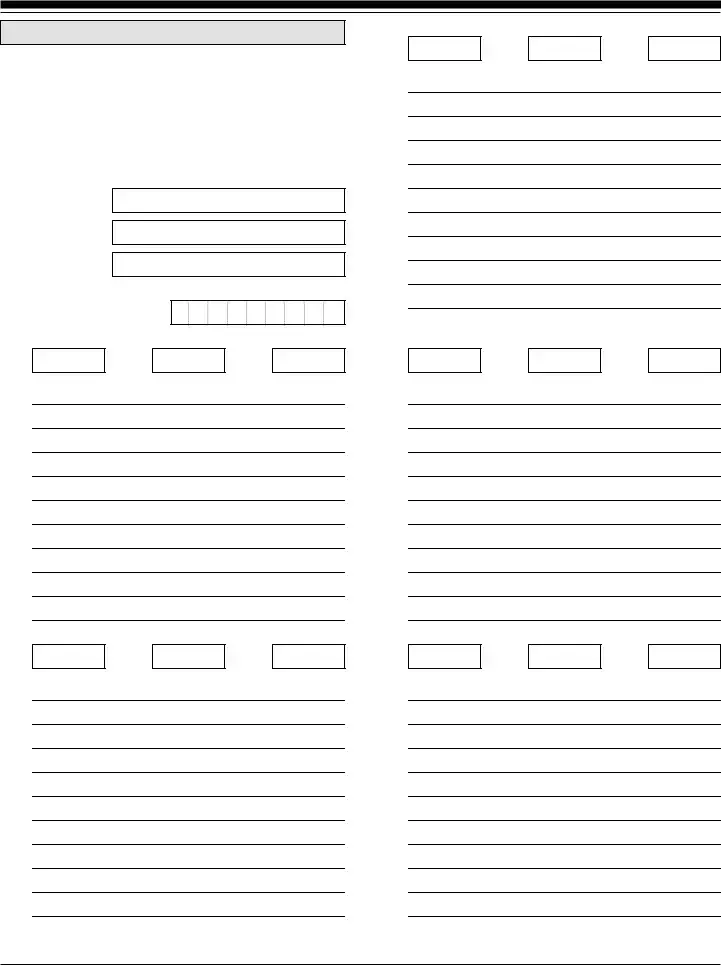
Part 3. Information About the Immigrants You Are Sponsoring
1.I am sponsoring the principal immigrant named in Part 2.
Yes |
No (Applicable only if you are sponsoring |
|
family members in Part 3. as the second |
|
joint sponsor or if you are sponsoring |
|
family members who are immigrating |
|
more than six months after the principal |
|
immigrant) |
2. I am sponsoring the following family members immigrating at the same time or within six months of the principal immigrant named in Part 2. (Do not include any relative listed on a separate visa petition.)
3. I am sponsoring the following family members who are immigrating more than six months after the principal immigrant.
Family Member 1
4.a. Family Name
(Last Name)
4.b. Given Name
(First Name)
4.c. Middle Name
5.Relationship to Principal Immigrant
6. Date of Birth (mm/dd/yyyy)
7.Alien Registration Number
► A-
8.USCIS Online Account Number (if any)
►
Family Member 2
9.a. Family Name
(Last Name)
9.b. Given Name
(First Name)
9.c. Middle Name
10.Relationship to Principal Immigrant
11. Date of Birth (mm/dd/yyyy)
12.Alien Registration Number
► A-
13.USCIS Online Account Number (if any)
►
Family Member 3
14.a. Family Name
(Last Name)
14.b. Given Name
(First Name)
14.c. Middle Name
15.Relationship to Principal Immigrant
16.Date of Birth (mm/dd/yyyy)
17.Alien Registration Number
► A-
18.USCIS Online Account Number (if any)
►
Family Member 4
19.a. Family Name
(Last Name)
19.b. Given Name
(First Name)
19.c. Middle Name
20.Relationship to Principal Immigrant
21.Date of Birth (mm/dd/yyyy)
22.Alien Registration Number
► A-
23.USCIS Online Account Number (if any)
►
Family Member 5
24.a. Family Name
(Last Name)
24.b. Given Name
(First Name)
24.c. Middle Name
25.Relationship to Principal Immigrant
26.Date of Birth (mm/dd/yyyy)
27.Alien Registration Number
► A-
28.USCIS Online Account Number (if any)
►







Form |
Page 2 of 10 |
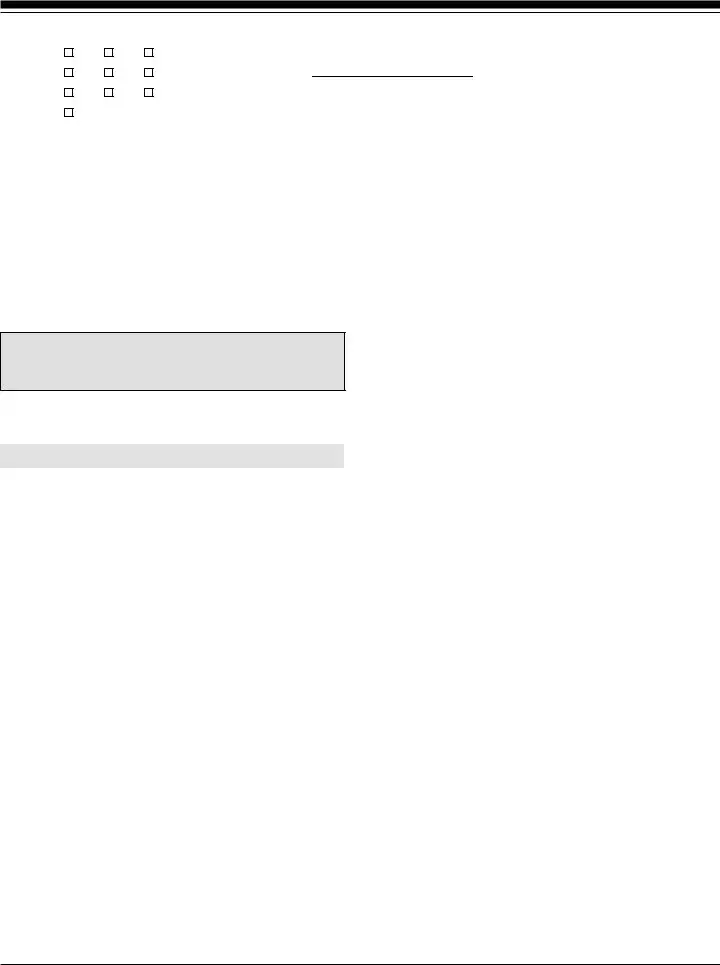
Part 3. Information About the Immigrants You Are Sponsoring (continued)
29. Enter the total number of immigrants you are sponsoring on |
this affidavit which includes the principal immigrant listed |
in Part 2., any immigrants listed in Part 3., Item |
Numbers 1. - 28. and (if applicable), any immigrants listed |
for these questions in Part 11. Additional Information. |
Do not count the principal immigrant if you are only |
Sponsor's Physical Address
4.a. Street Number
and Name
4.b. 
 Apt.
Apt. 
 Ste.
Ste. 
 Flr.
Flr.
4.c. City or Town
sponsoring family members entering more than 6 months |
after the principal immigrant. |
Part 4. Information About You (Sponsor)
Sponsor's Full Name
4.d. State
4.f. Province
4.g. Postal Code
4.h. Country
4.e. ZIP Code
1.a. Family Name
(Last Name)
1.b. Given Name
(First Name)
1.c. Middle Name
Sponsor's Mailing Address
2.a. In Care Of Name
2.b. Street Number
and Name
2.c. 
 Apt.
Apt. 
 Ste.
Ste. 
 Flr.
Flr.
2.d. City or Town
2.e. State |
|
2.f. ZIP Code |
|
|
|
2.g. Province
2.h. Postal Code
2.i. Country
3.Is your current mailing address the same as your physical
address? |
Yes |
No |
|
If you answered "No" to Item Number 3., provide your physical address in Item Numbers 4.a. - 4.h.
Other Information
5.Country of Domicile
6. Date of Birth (mm/dd/yyyy)
7.City or Town of Birth
8.State or Province of Birth
9.Country of Birth
10.U.S. Social Security Number (Required)
|
► |
|
|
|
|
|
|
|
|
|
Citizenship or Residency |
|
|
|
|
|
|
||||
11.a. |
I am a U.S. citizen. |
|||||||||
11.b. |
I am a U.S. national. |
|||||||||
11.c. |
I am a lawful permanent resident. |
|||||||||
12.Sponsor's
► A-
13.Sponsor's USCIS Online Account Number (if any)
►
Military Service (To be completed by petitioner sponsors only.)
14.I am currently on active duty in the U.S. Armed Forces
or U.S. Coast Guard. |
Yes |
No |
|
Form |
Page 3 of 10 |
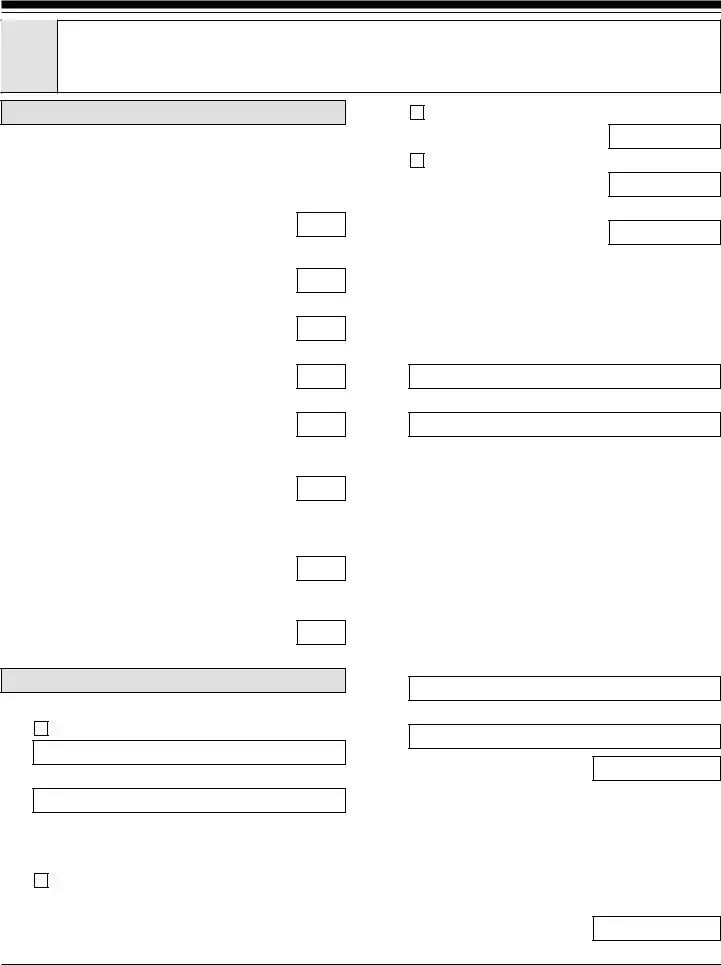
For
USCIS
Use
Only
Part 5. Sponsor's Household Size
NOTE: Do not count any member of your household more than once.
Persons you are sponsoring in this affidavit:
5.
6.
Retired Since (mm/dd/yyyy)
Unemployed Since (mm/dd/yyyy)
1.Provide the number you entered in Part 3., Item Number
29.
Persons NOT sponsored in this affidavit:
2. Yourself.
3.If you are currently married, enter "1" for your spouse.
4.If you have dependent children, enter the number here.
5.If you have any other dependents, enter the number here.
6.If you have sponsored any other persons on Form
enter the number here.
7.OPTIONAL: If you have siblings, parents, or adult children with the same principal residence who are combining their income with yours by submitting Form
8.Add together Part 5., Item Numbers 1. - 7. and enter the number here.
Household Size:
Part 6. Sponsor's Employment and Income
I am currently:
1. Employed as a/an
2.Name of Employer 1
7.My current individual annual income is:
$
Income you are using from any other person who was counted in your household size, including, in certain conditions, the intending immigrant. (See Form
Person 1
8.Name
9.Relationship
10. |
Current Income |
$ |
|
Person 2 |
|
|
|
|
|
||
11. |
Name |
|
|
|
|
|
|
12. |
Relationship |
|
|
|
|
|
|
13. |
Current Income |
$ |
|
|
|||
|
|
|
|
Person 3
14.Name
15.Relationship
16. Current Income |
$ |
Person 4
3. Name of Employer 2 (if applicable) |
17. Name |
||
|
|
|
|
4.
18. |
Relationship |
|
|
|
|
|
|
|
|
|
|
19. Current Income |
$ |
Form |
Page 4 of 10 |
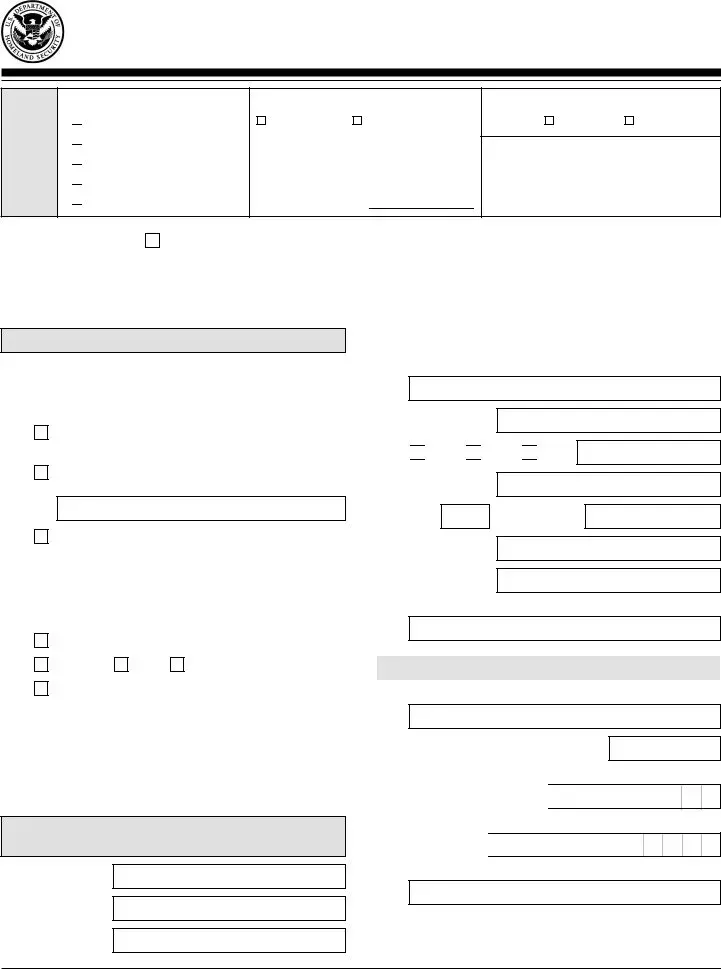
For
USCIS
Use
Only
Household Size

 1
1 
 2
2  3
3

 4
4 
 5
5  6
6

 7
7 
 8
8  9
9

 Other
Other
Poverty Guideline
Year: 2 0
Poverty Line:
$
Remarks
Part 6. Sponsor's Employment and Income
(continued)
20.My Current Annual Household Income (Total all lines from Part 6. Item Numbers 7., 10., 13., 16., and 19.; the total will be compared to Federal Poverty Guidelines on
|
Form |
$ |
|
|
|
|
|
|
|
|
|
21. |
The people listed in Item Numbers 8., 11., 14., and |
||
17.have completed Form
22. One or more of the people listed in Item Numbers 8., 11., 14., and 17. do not need to complete Form
Name
Federal Income Tax Return Information
23.a. Have you filed a Federal income tax return for each of the
three most recent tax years? |
Yes |
No |
|
NOTE: You MUST attach a photocopy or transcript of your Federal income tax return for only the most recent tax year.
23.b. (Optional) I have attached photocopies or transcripts of my Federal income tax returns for my second and third most recent tax years.
My total income (adjusted gross income on Internal Revenue Service (IRS) Form 1040EZ) as reported on my Federal income tax returns for the most recent three years was:
|
Tax Year |
|
Total Income |
24.a. Most Recent |
|
$ |
|
24.b. 2nd Most Recent |
|
$ |
|
|
|
||
24.c. 3rd Most Recent |
|
$ |
|
|
|
||
|
|
|
|
25. I was not required to file a Federal income tax return as my income was below the IRS required level and I have attached evidence to support this.
Part 7. Use of Assets to Supplement Income
(Optional)
If your income, or the total income for you and your household, from Part 6., Item Numbers 20. or 24.a. - 24.c., exceeds the Federal Poverty Guidelines for your household size, YOU ARE NOT REQUIRED to complete this Part 7. Skip to Part 8.
Your Assets (Optional)
1.Enter the balance of all savings and checking accounts.
$
2.Enter the net cash value of
$
3.Enter the net cash value of all stocks, bonds, certificates of deposit, and any other assets not already included in Item Number 1. or Item Number 2.
$
4.Add together Item Numbers 1. - 3. and enter the number
here. |
TOTAL: $ |
|
Assets from Form
5.a. Name of Relative
5.b. Your household member's assets from Form
(optional).$
Assets of the principal sponsored immigrant (optional).
The principal sponsored immigrant is the person listed in Part 2., Item Numbers 1.a. - 1.c. Only include the assets if the principal immigrant is being sponsored by this affidavit of support.
6.Enter the balance of the principal immigrant's savings and
checking accounts. |
$ |
|
7.Enter the net cash value of all the principal immigrant's real estate holdings. (Net value means investment value
minus mortgage debt.) |
$ |
|
8.Enter the current cash value of the principal immigrant's stocks, bonds, certificates of deposit, and other assets not included in Item Number 6. or Item Number 7.
$
Form |
Page 5 of 10 |
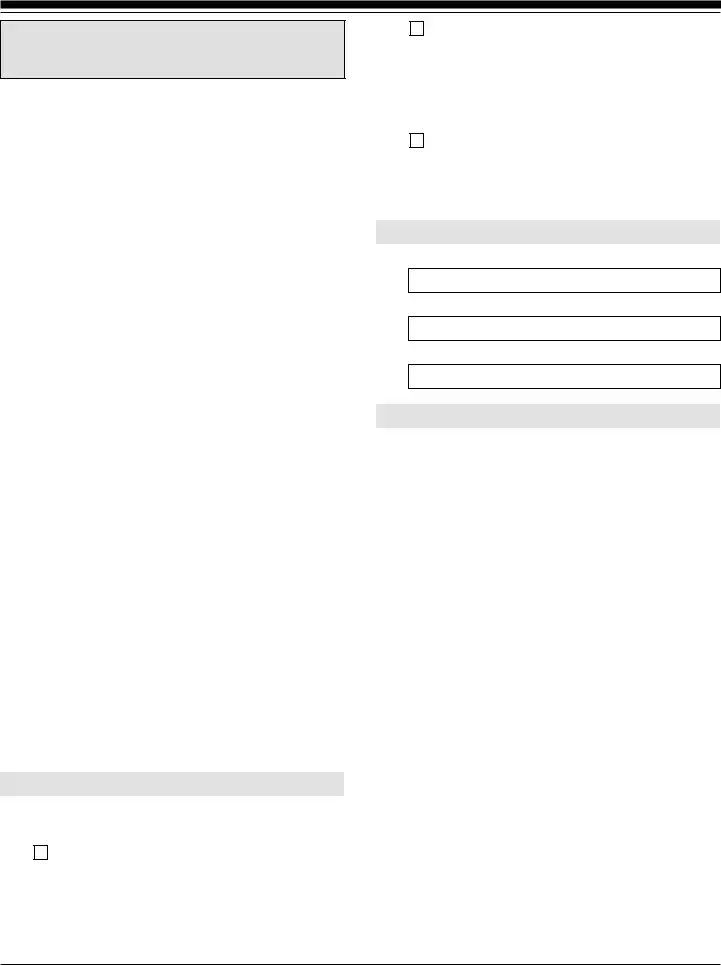
|
Household Size |
|
|
Poverty Guideline |
Sponsor's Household Income |
Remarks |
|||||
For |
1 |
2 |
3 |
|
|
Year: 2 0 |
(Page 5, Line 10) |
|
|||
|
|
|
|
|
|||||||
USCIS |
4 |
5 |
6 |
|
|
$ |
|
||||
|
|
|
|
|
|
|
|||||
Use |
|
|
|
|
|
|
|
||||
7 |
8 |
9 |
|
|
Poverty Line: |
The total value of all assets, line 10, must equal 5 times (3 times for spouses and children of |
|||||
Only |
|
|
|||||||||
|
|
|
|
|
|
|
|
|
USC's, or 1 time for orphans to be formally adopted in the U.S.) the difference between the |
||
|
Other |
|
|
|
$ |
|
|
|
|
||
|
|
|
|
|
|
|
|
poverty guidelines and the sponsor's household income, line 10. |
|||
|
|
|
|
|
|
|
|
|
|
|
|
Part 7. Use of Assets to Supplement Income |
What If I Choose Not to Sign Form |
||||
(Optional) (continued) |
|
|
The U.S. Government cannot make you sign Form |
||
9. |
Add together Item Numbers 6. - 8. and enter the number |
do not want to do so. But if you do not sign Form |
|||
intending immigrant may not become a lawful permanent |
|||||
|
here. |
$ |
|
||
|
|
||||
|
|
resident in the United States. |
|||
|
|
|
|||
|
|
|
|
||
Total Value of Assets |
|
|
What Does Signing Form |
||
|
|
|
|
||
10. |
Add together Item Numbers 4., 5.b., and 9. and enter the |
If an intending immigrant becomes a lawful permanent resident |
|||
|
number here. |
|
|
||
|
|
|
in the United States based on a Form |
||
|
TOTAL: $ |
|
|||
|
|
||||
|
|
signed, then, until your obligations under Form |
|||
|
|
|
|
||
|
|
|
|
you must: |
|
Part 8. Sponsor's Contract, Statement, Contact
Information, Declaration, Certification, and
Signature
NOTE: Read the Penalties section of the Form
Sponsor's Contract
Please note that, by signing this Form
What is the Legal Effect of My Signing Form
If you sign Form
Under this contract, you agree that, in deciding whether the intending immigrant can establish that he or she is not inadmissible to the United States as a person likely to become a public charge, the U.S. Government can consider your income and assets as available for the support of the intending immigrant.
A.Provide the intending immigrant any support necessary to maintain him or her at an income that is at least 125 percent of the Federal Poverty Guidelines for his or her household size (100 percent if you are the petitioning sponsor and are on active duty in the U.S. Armed Forces or U.S. Coast Guard, and the person is your husband, wife, or unmarried child under 21 years of age); and
B.Notify U.S. Citizenship and Immigration Services (USCIS) of any change in your address, within 30 days of the change, by filing Form
What Other Consequences Are There?
If an intending immigrant becomes a lawful permanent resident in the United States based on a Form
This provision does not apply to public benefits specified in section 403(c) of the Welfare Reform Act such as emergency Medicaid,
What If I Do Not Fulfill My Obligations?
If you do not provide sufficient support to the person who becomes a lawful permanent resident based on a Form
Form |
Page 6 of 10 |
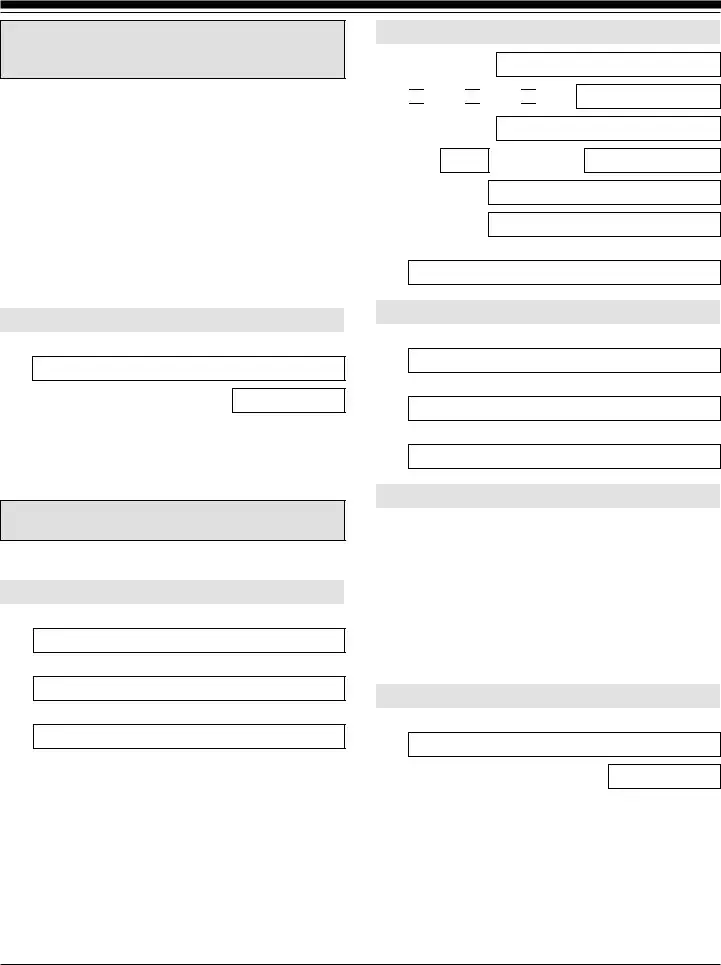
Part 8. Sponsor's Contract, Statement, Contact
Information, Declaration, Certification, and
Signature (continued)
If a Federal, state, local, or private agency provided any covered
If you are sued, and the court enters a judgment against you, the person or agency that sued you may use any legally permitted procedures for enforcing or collecting the judgment. You may also be required to pay the costs of collection, including attorney fees.
If you do not file a properly completed Form
When Will These Obligations End?
Your obligations under a Form
A.Becomes a U.S. citizen;
B.Has worked, or can receive credit for, 40 quarters of coverage under the Social Security Act;
C.No longer has lawful permanent resident status and has departed the United States;
D.Is subject to removal, but applies for and obtains, in removal proceedings, a new grant of adjustment of status, based on a new affidavit of support, if one is required; or
E.Dies.
NOTE: Divorce does not terminate your obligations under Form
Your obligations under a Form
Sponsor's Statement
NOTE: Select the box for either Item Number 1.a. or 1.b. If applicable, select the box for Item Number 2.
1.a. |
I can read and understand English, and I have read |
|
and understand every question and instruction on this |
|
affidavit and my answer to every question. |
1.b. |
The interpreter named in Part 9. read to me every |
|
|
question and instruction on this affidavit and my |
|
|
answer to every question in |
|
|
|
|
|
|
, |
|
a language in which I am fluent, and I understood |
|
|
everything. |
|
2. |
At my request, the preparer named in Part 10., |
|
|
|
, |
|
prepared this affidavit for me based only upon |
|
|
information I provided or authorized. |
|
Sponsor's Contact Information
3.Sponsor's Daytime Telephone Number
4.Sponsor's Mobile Telephone Number (if any)
5.Sponsor's Email Address (if any)
Sponsor's Declaration and Certification
Copies of any documents I have submitted are exact photocopies of unaltered, original documents, and I understand that USCIS or the U.S. Department of State (DOS) may require that I submit original documents to USCIS or DOS at a later date. Furthermore, I authorize the release of any information from any and all of my records that USCIS or DOS may need to determine my eligibility for the benefit that I seek.
I furthermore authorize release of information contained in this affidavit, in supporting documents, and in my USCIS or DOS records, to other entities and persons where necessary for the administration and enforcement of U.S. immigration law.
I certify, under penalty of perjury, that all of the information in my affidavit and any document submitted with it were provided or authorized by me, that I reviewed and understand all of the information contained in, and submitted with, my affidavit and that all of this information is complete, true, and correct.
A.I know the contents of this affidavit of support that I signed;
B.I have read and I understand each of the obligations described in Part 8., and I agree, freely and without any mental reservation or purpose of evasion, to accept each of those obligations in order to make it possible for the immigrants indicated in Part 3. to become lawful permanent residents of the United States;
C.I agree to submit to the personal jurisdiction of any Federal or state court that has subject matter jurisdiction of a lawsuit against me to enforce my obligations under this Form
Form |
Page 7 of 10 |

Part 8. Sponsor's Contract, Statement, Contact Information, Declaration, Certification, and
Signature (continued)
D. |
Each of the Federal income tax returns submitted in |
|
support of this affidavit are true copies, or are |
|
unaltered tax transcripts, of the tax returns I filed |
|
with the IRS; |
Interpreter's Mailing Address
3.a. Street Number
and Name
3.b. 
 Apt.
Apt. 
 Ste.
Ste. 
 Flr.
Flr.
3.c. City or Town
E. |
I understand that, if I am related to the sponsored |
|
immigrant by marriage, the termination of the |
|
marriage (by divorce, dissolution, annulment, or |
|
other legal process) will not relieve me of my |
|
obligations under this Form |
F. |
I authorize the Social Security Administration to |
|
release information about me in its records to |
|
USCIS and DOS. |
3.d. State
3.f. Province
3.g. Postal Code
3.h. Country
3.e. ZIP Code
Sponsor's Signature
6.a. Sponsor's Signature
6.b. Date of Signature (mm/dd/yyyy)
NOTE TO ALL SPONSORS: If you do not completely fill out this affidavit or fail to submit required documents listed in the Instructions, USCIS or DOS may deny your affidavit.
Part 9. Interpreter's Contact Information, Certification, and Signature
Provide the following information about the interpreter.
Interpreter's Full Name
1.a. Interpreter's Family Name (Last Name)
1.b. Interpreter's Given Name (First Name)
2.Interpreter's Business or Organization Name (if any)
Interpreter's Contact Information
4.Interpreter's Daytime Telephone Number
5.Interpreter's Mobile Telephone Number (if any)
6.Interpreter's Email Address (if any)
Interpreter's Certification
I certify, under penalty of perjury, that:
I am fluent in English and |
|
, |
which is the same language specified in Part 8., Item Number 1.b., and I have read to this sponsor in the identified language every question and instruction on this affidavit and his or her answer to every question. The sponsor informed me that he or she understands every instruction, question, and answer on the affidavit, including the Sponsor's Declaration and Certification, and has verified the accuracy of every answer.
Interpreter's Signature
7.a. Interpreter's Signature
7.b. Date of Signature (mm/dd/yyyy)
Form |
Page 8 of 10 |

Part 10. Contact Information, Declaration, and Signature of the Person Preparing this Affidavit, if Other Than the Sponsor
Provide the following information about the preparer.
Preparer's Full Name
1.a. Preparer's Family Name (Last Name)
1.b. Preparer's Given Name (First Name)
2.Preparer's Business or Organization Name (if any)
Preparer's Mailing Address
3.a. Street Number
and Name
3.b. 
 Apt.
Apt. 
 Ste.
Ste. 
 Flr.
Flr.
3.c. City or Town
Preparer's Statement
7.a. |
I am not an attorney or accredited representative but |
|
|
have prepared this affidavit on behalf of the sponsor |
|
|
and with the sponsor's consent. |
|
7.b. |
I am an attorney or accredited representative and my |
|
|
representation of the sponsor in this case |
|
|
extends |
does not extend beyond the |
preparation of this affidavit.
NOTE: If you are an attorney or accredited representative, you may be obliged to submit a completed Form
Preparer's Certification
By my signature, I certify, under penalty of perjury, that I prepared this affidavit at the request of the sponsor. The sponsor then reviewed this completed affidavit and informed me that he or she understands all of the information contained in, and submitted with, his or her affidavit, including the
3.d. State
3.f. Province
3.g. Postal Code
3.h. Country
3.e. ZIP Code
Sponsor's Declaration and Certification, and that all of this information is complete, true, and correct. I completed this affidavit based only on information that the sponsor provided to me or authorized me to obtain or use.
Preparer's Signature
8.a. Preparer's Signature
Preparer's Contact Information
4.Preparer's Daytime Telephone Number
5.Preparer's Mobile Telephone Number (if any)
6.Preparer's Email Address (if any)
8.b. Date of Signature (mm/dd/yyyy)
Form |
Page 9 of 10 |

Part 11. Additional Information
If you need extra space to provide any additional information within this affidavit, use the space below. If you need more space than what is provided, you may make copies of this page to complete and file with this affidavit or attach a separate sheet of paper. Type or print your name and
1.a. Family Name
(Last Name)
1.b. Given Name
(First Name)
1.c. Middle Name
2.
► A-
3.a. Page Number 3.b. Part Number 3.c. Item Number
3.d.
4.a. Page Number 4.b. Part Number 4.c. Item Number
4.d.
5.a. Page Number 5.b. Part Number 5.c. Item Number
5.d.
6.a. Page Number 6.b. Part Number 6.c. Item Number
6.d.
7.a. Page Number 7.b. Part Number 7.c. Item Number
7.d.
Form |
Page 10 of 10 |
Other PDF Templates
Profits or Loss From Business - Reviewing past Schedule Cs can inform your future business decisions.
The Employment Verification Form plays a crucial role in confirming an individual's employment history and status with a specific employer, making it invaluable for prospective employers, landlords, and financial institutions in assessing a person's qualifications and reliability. For those looking to obtain a well-structured template, resources like Top Forms Online can be highly beneficial in streamlining the employment verification process.
Can You File a Lien Without a Notice to Owner in Florida - This form is part of the legal process to protect a contractor’s right to be paid for work done.
Documents used along the form
The USCIS I-864 form, also known as the Affidavit of Support, is a critical document for individuals seeking to sponsor a relative for immigration to the United States. Along with this form, several other documents are often required to ensure a complete application. Below is a list of important forms and documents that may accompany the I-864.
- Form I-130: This is the Petition for Alien Relative. It establishes the relationship between the sponsor and the immigrant. The approval of this form is a prerequisite for the I-864.
- Job Verification Letter: It is crucial to obtain a Job Verification Letter as it may be necessary for the immigration forms to prove employment history and financial stability.
- Form I-485: This is the Application to Register Permanent Residence or Adjust Status. It is used by individuals already in the U.S. to apply for a green card.
- Form I-864A: This is the Contract Between Sponsor and Household Member. If a household member is contributing income to support the immigrant, this form is necessary to include their income in the calculation.
- Tax Returns: The sponsor must provide copies of their federal income tax returns for the last three years. This documentation verifies the sponsor's financial stability.
- Proof of Income: This includes recent pay stubs, employment letters, or other documents showing current income. It demonstrates the sponsor's ability to support the immigrant financially.
Providing these documents along with the I-864 is essential for a successful immigration application. Each document plays a specific role in demonstrating eligibility and financial capability, ensuring a smoother process for both the sponsor and the immigrant.
Similar forms
The USCIS I-864 form, also known as the Affidavit of Support, serves as a commitment from a sponsor to support an immigrant financially. Similar to this form is the I-134, Affidavit of Support. The I-134 is used for non-immigrant visa applicants, such as tourists or students. Like the I-864, the I-134 requires the sponsor to demonstrate their financial ability to support the applicant, ensuring that the individual will not become a public charge during their stay in the United States.
Another document that bears similarities to the I-864 is the I-130, Petition for Alien Relative. While the I-130 primarily establishes a qualifying relationship between the petitioner and the immigrant, it also requires financial information. The petitioner must show that they can support the immigrant, though the I-130 does not impose the same binding financial commitment as the I-864 does for permanent residency.
The I-751, Petition to Remove Conditions on Residence, is also relevant. This form is used by conditional residents who need to prove their ongoing relationship with their spouse. While it focuses more on the relationship aspect, it also requires financial documentation similar to the I-864 to demonstrate that the couple can support themselves without government assistance.
The I-140, Immigrant Petition for Alien Worker, shares some characteristics with the I-864. This form is for employment-based immigration and requires evidence of the employer's ability to pay the offered wage. Though it centers on employment, it aligns with the I-864 in ensuring that the immigrant will not rely on public benefits.
The DS-260, Immigrant Visa Electronic Application, is another document that resembles the I-864. When applying for an immigrant visa, the DS-260 requires applicants to provide information about their financial situation. This helps consular officers assess whether the applicant will be financially self-sufficient, similar to the intent of the I-864.
The Form I-485, Application to Register Permanent Residence or Adjust Status, also requires financial information. Applicants must submit the I-864 along with the I-485 to demonstrate their sponsor's ability to support them. Both forms work together to ensure that the immigrant will not become dependent on government assistance.
The Form N-400, Application for Naturalization, includes financial questions that reflect the applicant's ability to support themselves. While the focus is on citizenship, the form requires applicants to disclose any reliance on public benefits, akin to the financial assurances sought in the I-864.
In addition to these essential forms, it's vital to consider the Motor Vehicle Bill of Sale form, which plays a significant role in legal transactions involving vehicle ownership transfers, ensuring all parties have clear documentation of the sale and preventing future disputes.
The Form I-601, Application for Waiver of Grounds of Inadmissibility, may also relate to financial support. Applicants often need to show that they have a qualifying relative who can support them financially. This financial aspect echoes the commitment found in the I-864, emphasizing the importance of self-sufficiency.
Lastly, the Form I-912, Request for Fee Waiver, requires applicants to provide financial information to justify their request. While it serves a different purpose, it highlights the financial considerations that underpin many immigration processes, similar to the I-864’s focus on ensuring that immigrants have adequate support.
Dos and Don'ts
When filling out the USCIS I-864 form, it is important to follow specific guidelines to ensure accuracy and completeness. Here are some dos and don'ts to keep in mind:
- Do provide accurate and complete information.
- Do sign and date the form where required.
- Do include all necessary supporting documents.
- Do double-check for any errors before submission.
- Don't leave any required fields blank.
- Don't submit the form without a photocopy of your ID.
Key takeaways
When filling out and using the USCIS I-864 form, there are several important points to keep in mind. This form, known as the Affidavit of Support, plays a crucial role in the immigration process. Here are some key takeaways:
- The I-864 form is required for most family-based immigration cases, ensuring that the immigrant has adequate financial support.
- It is important to provide accurate and complete information. Incomplete or incorrect forms can lead to delays or denials.
- Income must meet or exceed 125% of the Federal Poverty Guidelines for the household size. This requirement ensures that the immigrant will not become a public charge.
- Use the most recent version of the form. USCIS updates forms periodically, and using an outdated version may result in processing issues.
- Supporting documents must be included with the form. This typically includes tax returns, W-2 forms, and proof of current employment.
- If the sponsor's income is not sufficient, they may include assets to meet the financial requirement. Assets must be easily convertible to cash and meet specific thresholds.
- Joint sponsors can be used if the primary sponsor does not meet the income requirements. A joint sponsor must also complete a separate I-864 form.
- Once submitted, keep a copy of the completed I-864 and all supporting documents for your records. This can be helpful for future reference or if any questions arise.
How to Use USCIS I-864
After gathering the necessary information, you are ready to fill out the USCIS I-864 form. This form is crucial for demonstrating your financial ability to support an immigrant. Completing it accurately is essential for a smooth immigration process.
- Begin by entering your full name in the designated fields at the top of the form.
- Provide your mailing address. Ensure it is current and complete.
- Fill in your phone number and email address for contact purposes.
- Indicate your relationship to the immigrant you are sponsoring.
- Complete the section regarding your employment. Include your current employer’s name and address, along with your job title.
- List your annual income. Use your most recent tax return as a reference.
- If you have dependents, provide their information in the appropriate section.
- Detail any additional income or assets that may support your application. This can include savings, property, or investments.
- Sign and date the form at the end. Ensure that your signature is clear and matches the name provided at the beginning.
- Make a copy of the completed form for your records before submitting it.
After completing the form, review it thoroughly for any errors or omissions. Once you are confident that all information is accurate, you can submit it along with the required supporting documents to USCIS. This step is vital for moving forward in the immigration process.
